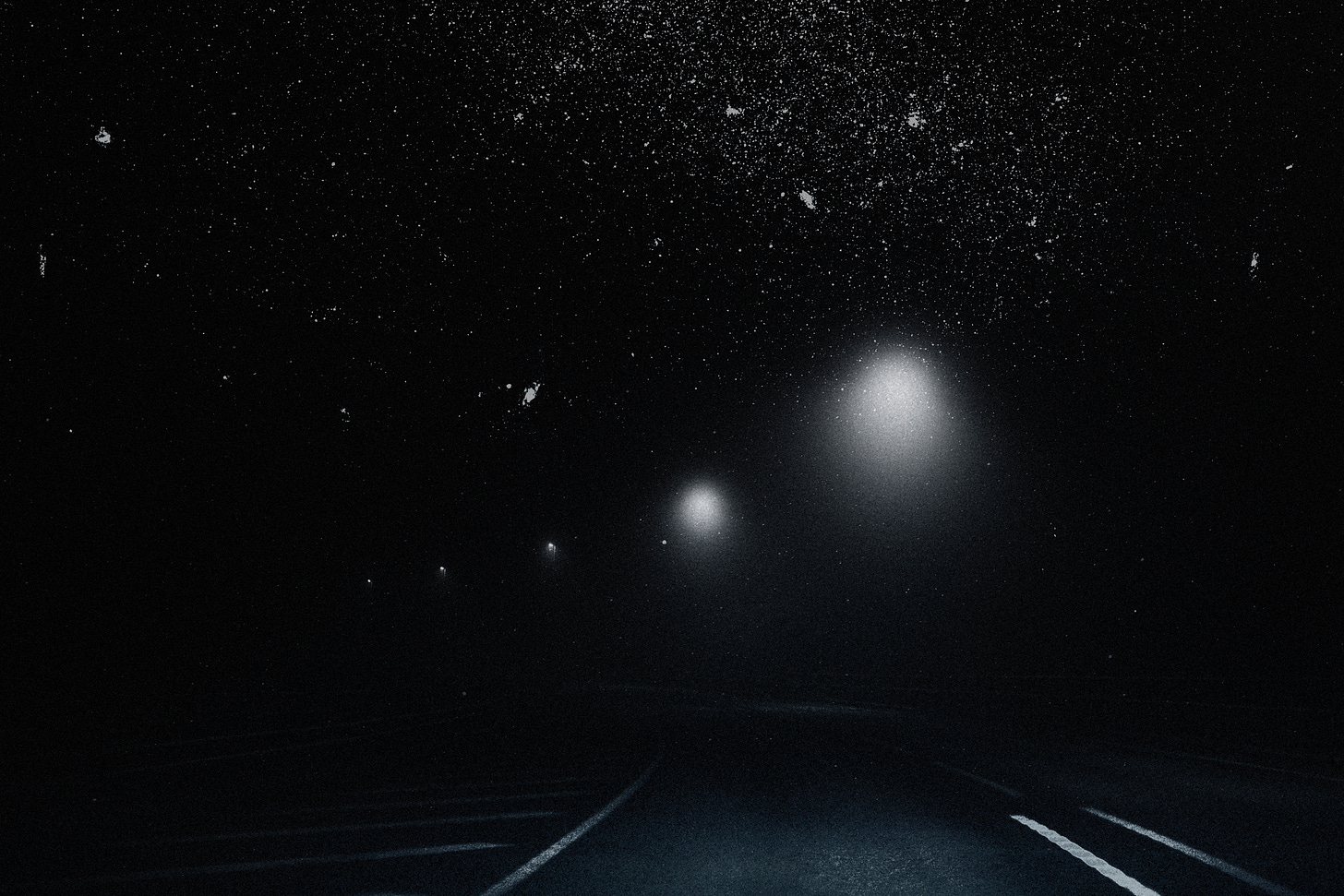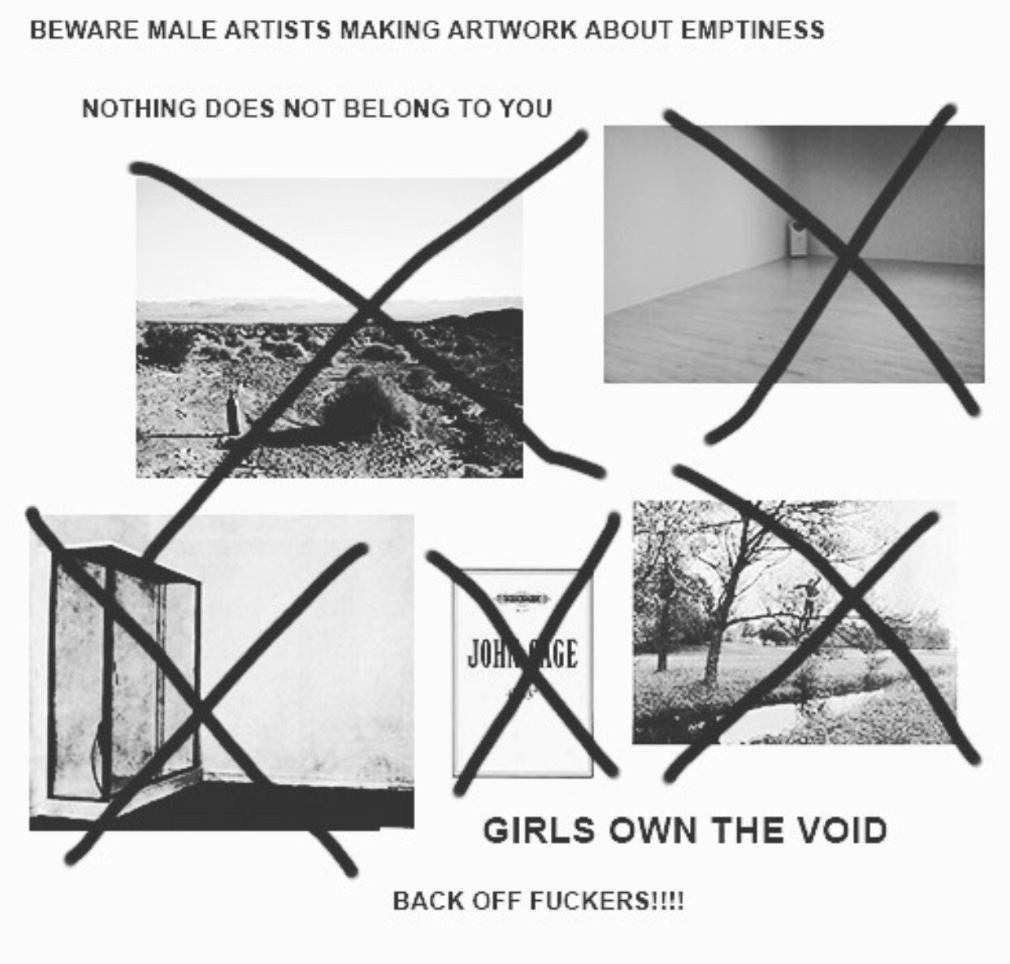Sunday Sermon #2: The Void
What is your relationship with the void? Do you like it here in this collective cultural one we're experiencing?
Image via.
Sunday Sermons are short essays on spirituality, delivered to your inbox every first Sunday of the month.
I want to take you on my favourite drive home. You’re mentally tired; it’s been a long day—nothing stressful, just filled with activities. You’re probably buzzed on sweets or Coke but going over the speed limit down country lanes is oddly relaxing. It’s dark and Dad is driving, so you feel safe. You’ve been strapped into the backseat for half an hour of being hurtled through time and space. There’s no traffic on the roads. You wind the window down a fraction, even though it makes a loud buffeting noise and someone will tell you to put it up any second. The outside smells like cold night sky, bonfire smoke and damp grass.
When you lean toward the middle of the car to look through the windscreen, all you see is what the theatrical beam of the headlights allows: a blur of trees, a brush of long grass and the dotted white line that looks deceptively solid stretching ahead and behind. You’re heading into the void.
The drive I’m imagining is the stretch between Newport (the so-called capital of the Isle of Wight) and Brading (the small Victorian town where I grew up). We would bomb it across the downs on those winding lanes and eventually get spat out right next to my house. When I sat at the blank document today to write something, I closed my eyes and found myself back on that drive. Looking back, I enjoyed that journey so much as a kid because it felt like a magical liminal nighttime arena.
I’m familiar with this sort of shapeless space in my personal life—a time when parts of me are ending or relationships have closed, and I’m waiting for something new to emerge. It’s an inescapable part of being human. But I don’t feel as comfortable in this collective void we’re all navigating now. Since the pandemic, we’ve been in transition. Life as we knew it for so long has broken down but nothing meaningful has come to replace it.
Our institutions are crumbling: traditional industries are struggling, the Media™ is floundering, no one wants to read, criticism is done for, and storytelling is dwindling, unless you count crime dramas and whatever is happening when celebrities go on podcasts. The spectre of AI and tech bro supremacy looms over artists and media workers of all kinds. I appreciate some democratisation of narrative but when everyone has a voice, there is no cohesive story that anyone wants to listen to beyond the one they’ve decided to run with.
Basic tenets of being alive—the ones we took for granted as constants—have been destabilised, like knowing what is true and what matters on a larger scale and why. It has infused the culture with a sincerely felt paranoia that no one can be trusted. Established institutions, experts, politicians, and even the people in our lives feel unreliable. No one is coming to save us and anything could happen to the world when the aforementioned tech giants wield more power than governments. The working week, career progression, traditional life milestones—much that so recently provided a sense of order to a life has broken down and we’re each left to piece together a structure of our own accord. That freedom is an alluring opportunity, but the void is a magnet for addiction and loneliness. It’s a big responsibility.
Maybe I feel this pertinently because women are good readers of vibes and it’s more a felt experience of the world than anything concrete. Women, too, are in the void, experiencing the biggest shift since being legally allowed to have credit cards and mortgages fifty years ago. Will we stop having kids? Are we going to be increasingly single? Will we run the world, as the 2010s promised, or continue to be subjugated by economic forces, the right-wing and religious fundamentalists? You can’t be on the internet without seeing the debate around plummeting birth rates or trad wife content, but we don’t yet know the lived results of it all.
‘Girls Own The Void’ by Audrey Wollen.
People seem to be changing as quickly as the culture is. When we came out of the pandemic we were wired differently. I can’t tell you how, I just felt it—didn’t you? More autonomous, more self-interested but more spiritual. Smarter, dumber, more connected, more alone. This is an extension of the same transformation.
So what can I do while living in the void? Writing this, I realise I can’t change its shape or timeline. Unconsciously, I have wasted time wanting to get out of this post-pandemic dead zone. I’ve mentally tried to fix the world, to resolve its wrongs, and know how the story ends. A textbook case of not having the serenity to accept the things I cannot change. What if I just accepted that we’re here and that it’s a space of cultural potency? Maybe I could draw my own limits and operate within the confines of that. What can I do today, knowing nothing?
Whenever I’ve had my own void-like period, I’ve coped best when I assumed the role of the back seat passenger, rather than the driver. I don’t try to pretend I know where I’m going, but I trust that something like home will be waiting for me.
I don’t think existing in the void has to be a totally passive experience, though. It’s a forced pause that feels dead but something in it is alive. Embracing the backseat consciousness lets me observe without directing, and let go of control without losing curiosity. If I allow the void to shape me if it wants to, it’s not about waiting for something to happen. It’s about learning to be present in uncertainty, trusting that something valuable lies at the end of the road—even if it’s unexpected.
What is your relationship with the void? Do you like it here? Could you make a house of it and then feel comfortable burning it down?







Really appreciated this article today, particularly the point about post-pandemic different wiring. An the void, I was recently getting in my head on the dancefloor and had what felt like a bit of a revelation that I should just allow this scene infront of me to be like a river that I join and roll with, it's not about me. I've also been reading 'how to do nothing' by Jenny Odell which makes the case for taking a step back but not out of the zone all together, staying in here with your neighbours but looking at things from a different angle, noticing your surroundings and taking them for what they are, not what you want them to be / are worried that they might be. I find this helpful too.